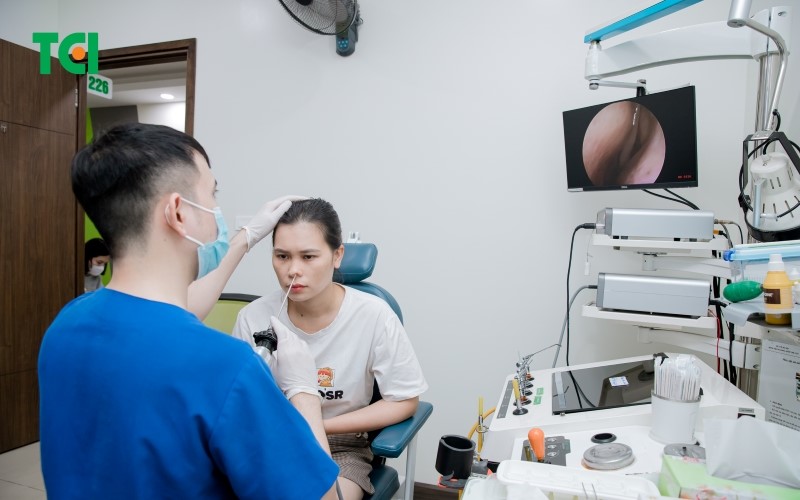Chronic sinusitis can lead to serious complications, especially those related to the respiratory system. In severe cases, it may also affect the eyes or even cause intracranial complications. Early recognition and proper treatment of the condition are essential to prevent these risks and should be a focus in daily life. Let’s explore the critical aspects of chronic sinusitis with TCI, and learn how to recognize and manage this condition effectively.
1. Understanding and Identifying Chronic Sinusitis
1.1 General Overview
Sinusitis refers to the inflammation and mucus buildup within the sinuses around the nose, which block normal drainage. It is commonly triggered by infections (viral, bacterial, or fungal) or allergies. Chronic sinusitis is diagnosed when the inflammation persists for at least 12 weeks, often lasting for months or even years.
Some primary causes of chronic sinusitis include:
– Untreated or improperly treated acute sinusitis
– Allergic rhinitis
– Gastroesophageal reflux disease (GERD)
– Anatomical abnormalities in the nasal or sinus regions, such as enlarged adenoids or a deviated septum
– Environmental factors like smoke, pollution, or irritants
Chronic sinusitis often requires prolonged treatment and is prone to recurrence, which can make patients feel discouraged. However, neglecting the condition can lead to various complications, such as middle ear infections, bronchitis, or orbital cellulitis (eye socket infections). The most serious potential complications include meningitis or brain abscesses. Therefore, recognizing symptoms early and seeking proper treatment is crucial to avoid these dangers.

In addition to health issues and nasal sinus structure, environmental factors also contribute to the development of sinusitis.
1.2 Recognizing Chronic Sinusitis
Chronic sinusitis is characterized by symptoms lasting over 12 weeks, including:
– Nasal congestion
– Thick nasal discharge, either mucus or pus
– Facial pain or pressure in the sinus areas
– Reduced sense of smell
– Persistent cough, headache, and fatigue
– Bad breath (halitosis)
During a medical examination, sinus endoscopy may reveal thick or purulent nasal discharge, swelling or nasal polyps, or enlarged adenoids. In some cases, anatomical irregularities like a deviated septum or concha bullosa (enlarged nasal turbinates) can also be identified. A CT scan is often used to assess the extent of sinusitis, determine the thickness of the sinus lining, and identify any nasal polyps or obstructions that may be present.
It’s important to note that chronic sinusitis shares similar symptoms with other respiratory conditions, making self-diagnosis difficult and potentially dangerous. Misdiagnosis or incorrect treatment can increase the risk of complications. Therefore, proper diagnosis and treatment should always be carried out under the supervision of an ENT (Ear, Nose, and Throat) specialist to ensure effective management and to reduce the likelihood of recurrence.
2. Treating Chronic Sinusitis
The main goals in treating chronic sinusitis are to eliminate the underlying causes, ensure proper sinus drainage, and provide both local and systemic treatment. Additionally, patients should rest and avoid factors that could trigger or exacerbate sinusitis.

Based on the condition and cause of chronic sinusitis, doctors will prescribe an appropriate treatment plan for the patient.
Depending on the severity and cause, treatment may involve either medical (non-surgical) approaches or surgical interventions.
2.1 Medical (Non-Surgical) Treatment
In cases where chronic sinusitis presents with mild symptoms and there are no significant anatomical issues, non-surgical treatments are typically recommended. These treatments include systemic medications, local treatments, and lifestyle changes to improve overall health.
Systemic medications may involve antibiotics (if necessary) for 2-3 weeks and oral corticosteroids to reduce inflammation. Local treatments may include nasal decongestants, saline nasal irrigation, and nasal corticosteroid sprays to alleviate symptoms. It’s important for patients to strictly follow prescribed dosages and avoid overusing nasal sprays, as misuse can lead to further complications.

In some cases, sinusitis can be treated with medical therapy.
2.2 Surgical Treatment for Chronic Sinusitis
Surgical intervention is typically considered when medical treatment fails to provide adequate relief, or when specific conditions like nasal polyps or anatomical abnormalities (such as obstructed sinus drainage pathways) contribute to the problem.
Functional endoscopic sinus surgery (FESS) is the most common surgical option for chronic sinusitis. This minimally invasive procedure involves the use of an endoscope to remove blockages and improve sinus drainage. At TCI, patients with severe chronic sinusitis often benefit from advanced surgical techniques that address not only the inflammation but also underlying anatomical issues like a deviated septum or enlarged turbinates.
Post-surgical care is essential for recovery, and it typically includes:
– Removal of nasal packing (Merocel) within 24 hours after surgery
– Continued use of nasal decongestants, saline nasal irrigation, and corticosteroid sprays
– Systemic antibiotics for 1-2 weeks, along with oral corticosteroids if needed
– Maintaining a healthy diet, supplementing with vitamins and minerals, and engaging in light exercise to support overall recovery
Conclusion
Chronic sinusitis can easily be mistaken for other ENT conditions due to its similar symptoms. Proper diagnosis and treatment depend on understanding the underlying causes and receiving professional medical care. If you suspect you have chronic sinusitis, it’s crucial to visit an ENT specialist promptly for evaluation and personalized treatment planning.








